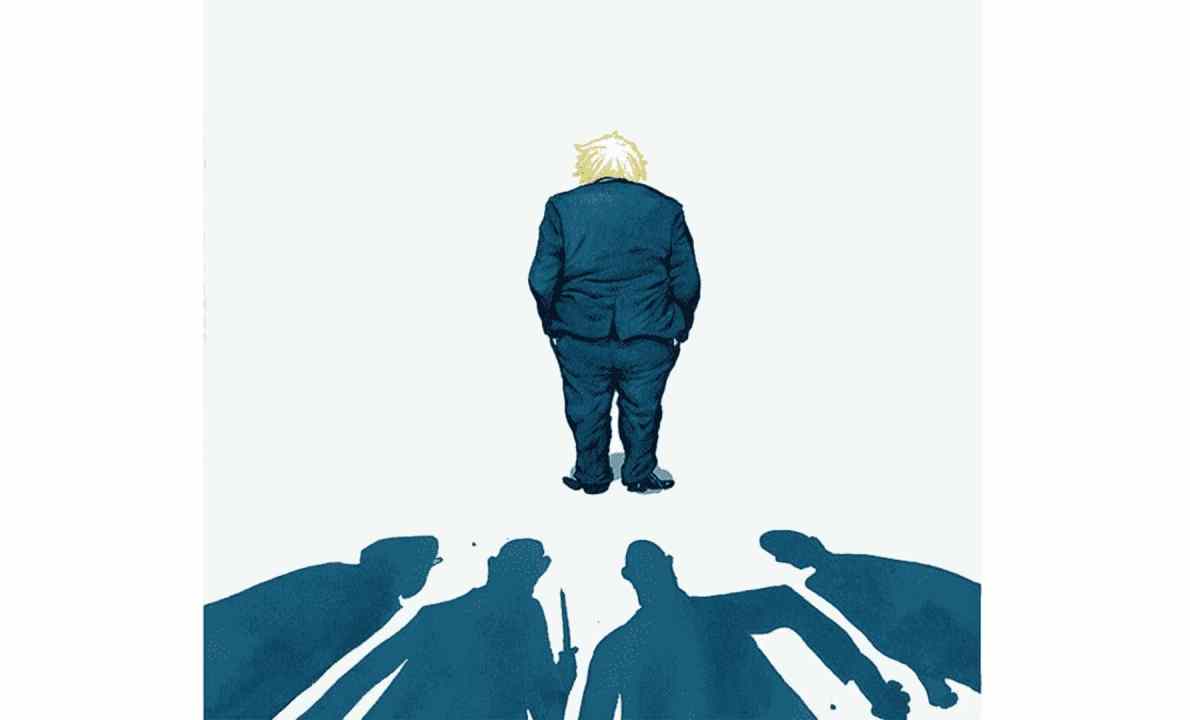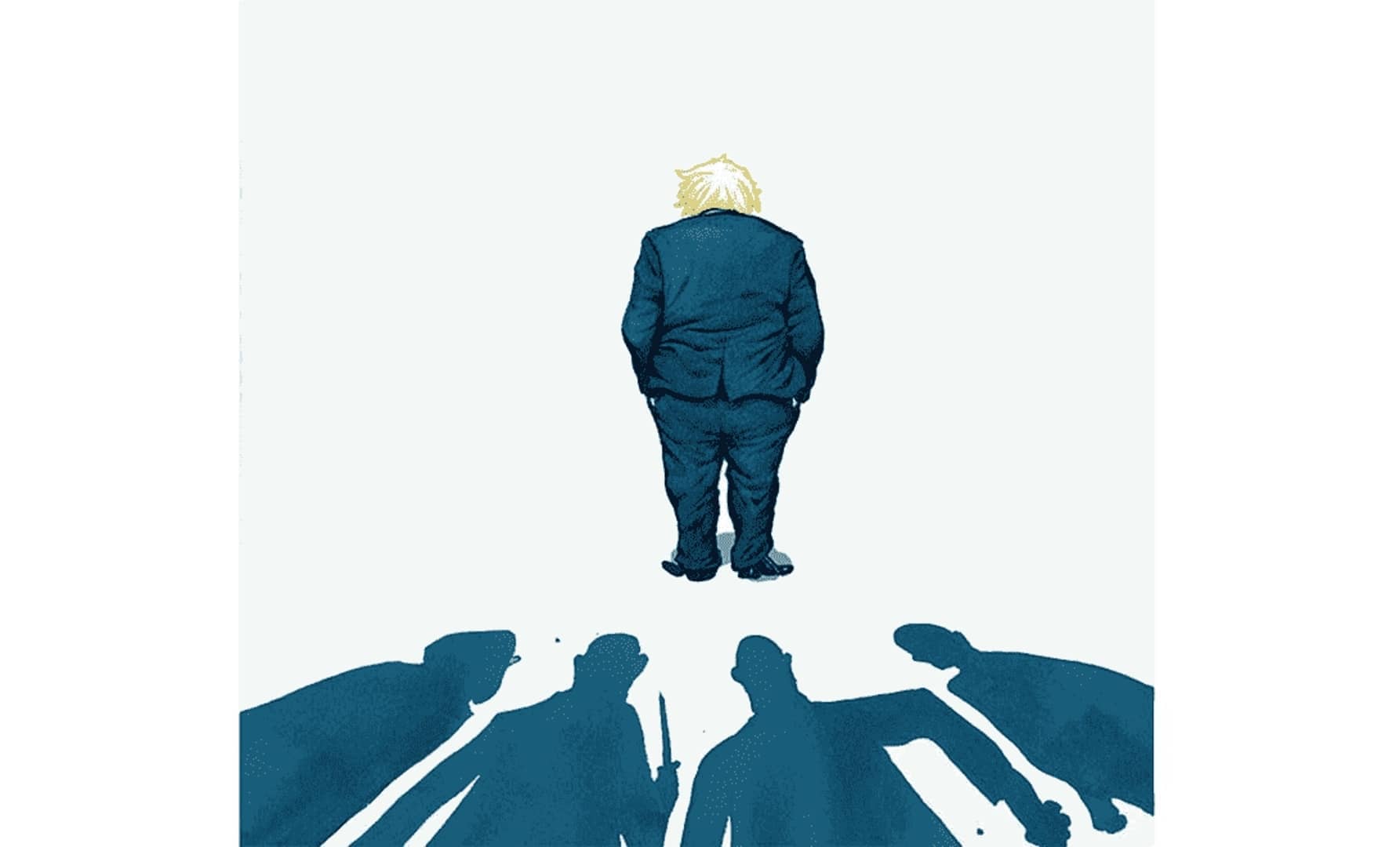It is a very long time since David Maxwell Fyfe, a Tory home secretary in the early 1950s, said that ‘Loyalty Is the Tory party’s secret weapon’. It may not even have been true when he uttered the quote, and as the party messily defenestrates its latest leader, it is certainly not true today.
In fact, of Britain’s two major parties, it is Labour which has proved most reluctant to dump a failing leader, while the Tories have frequently been ready to unsheath the daggers and ruthlessly despatch their leaders to oblivion, often at the first sign of political stumbling or unpopularity. Uneasy lie the heads that wear the Tory crown, for the wearers must forever be casting backward glances to see if their troops are really following them, or sliding up to stab them in the back.
Boris Johnson is now following a long list of his predecessors into the political graveyard, after Tory MPs and ministers fell over themselves in calling for him to go. So loyalty is not the first quality that springs to mind as we observe behaviour that more resembles a flock of headless chickens in a fox-invaded henhouse than Europe’s oldest, most sophisticated and successful political machine in action.
The Tories first acquired their taste for politically eviscerating their chieftains exactly 100 years ago at the Carlton Club – traditional cradle for hatching Conservative coups, and more recently the scene of Chris Pincher’s alleged misbehaviour, which was the final straw to bring Boris Johnson’s embattled premiership crashing down.
In 1922, Tory backbenchers, meeting at the Carlton, rejected the advice of their leaders – Austen Chamberlain, F.E. Smith and Andrew Bonar Law – and voted to withdraw their support for the prime minister, David Lloyd George. Though nominally a Liberal, Lloyd George was actually a prisoner of the Tories who had first brought him to power in 1916 and formed the vast majority of MPs in his ruling coalition.
Like Boris, the Welsh PM was known for his colourful private life, light devotion to his own advancement, and his early electoral popularity. Like Boris, he had won a stonking electoral victory only a few years before his abrupt defenestration. None of this saved him, and though F.E. Smith sniffed that the ‘cabin boys have mutinied and taken over the ship’ once the backbench ‘cabin boys’ had tasted their power, they never looked back.
That historic Carlton Club meeting led to the formation of the 1922 committee – the ‘Trade Union’ of Tory backbenchers who have so often provided the muscle for Tory mutinies and seem to have done so once again in the storm that has brought down Boris Johnson.
In 1940, the Tory rank and file flexed their muscles once again when many of them revolted against the failing Second World War leadership of appeasing Neville Chamberlain, and voted against him in the famous Parliamentary debate on the ignominious fiasco of the Norway campaign. Though – like Boris in last month’s confidence vote – Chamberlain survived the debate, his authority was fatally shot, and he resigned the next day in favour of Winston Churchill.
Though initially unpopular with many Tory MPs, the authority and popularity accrued by Churchill as the nation’s victorious and indomitable leader in WWII carried him through Labour’s landslide win in 1945 and returned him for another Indian summer of power in 1951.
Churchill’s loyal lieutenant and successor Anthony Eden, the victim of his own misbegotten invasion of Egypt in 1956, was, like Boris, undermined by his own Chancellor Harold MacMillan. ‘Supermac’ lost no time in distancing himself from the Suez debacle that he had at first enthusiastically supported, and deftly eased himself into Number Ten when Eden quit, ostensibly on grounds of ill health.
The wily MacMillan proved an adept party manager, and – unlike Boris – even survived the resignation of his Chancellor and entire Treasury ministerial team, dismayed by his free spending inflationary policies. Like Boris, though, the cumulative effect of a series of scandals and lost by elections ate away at his authority, and facing a looming electoral defeat at Labour’s hands, MacMillan too, like Eden, threw in the towel on health grounds.
The next Tory PM to be knifed by his own MPs was Edward Heath, whose ill-starred Government was laid low by industrial strife in 1974. Heath, like Boris, stubbornly clung to the leadership, in his case refusing to go even after losing two elections to Labour. Though, like Lloyd George, the party’s high command remained loyal to him, a peasants’ revolt among his backbenchers deposed Heath in favour of Margaret Thatcher in 1975.
The most notorious Conservative coup in modern history was the brutal dethroning of Margaret Thatcher in 1990. The victor of three general elections in succession, and a revered world leader who had retaken the Falklands, helped win the Cold War, and transformed Britain from a strike ridden basket case into a modern and thrusting market economy, Mrs Thatcher genuinely bestrode the stage as a colossus. All of her achievements counted for nothing, though, when her own MPs grew weary with her imperious and increasingly autocratic ways.
After narrowly failing to decisively trounce her challenger Michael Heseltine, a defiant and tearful Mrs Thatcher, like Boris in his last hours in office, was confronted by her own Cabinet who, one by one, told her it was time to go. The coup that brought her down inflicted deep wounds in the Tory party, particularly over Europe, that continue to reverberate today.
The long Tory civil war over Europe did for both David Cameron and Britain’s second woman PM, Theresa May. Mrs May was the next Tory leader to suffer political death by a thousand cuts at the hands of her own MPs who refused to vote her half-hearted Brexit deal through a paralysed Parliament.
As Boris Johnson packs his bags and prepares for his enforced departure from Downing Street he has cause to ruefully reflect on the old saying that the opposition is in front of him, but the real enemies who brought him down are the party colleagues beside and behind him who only recently were protesting their eternal and loyal fidelity. Disloyalty is, after all, the traditional Tory way.







Comments